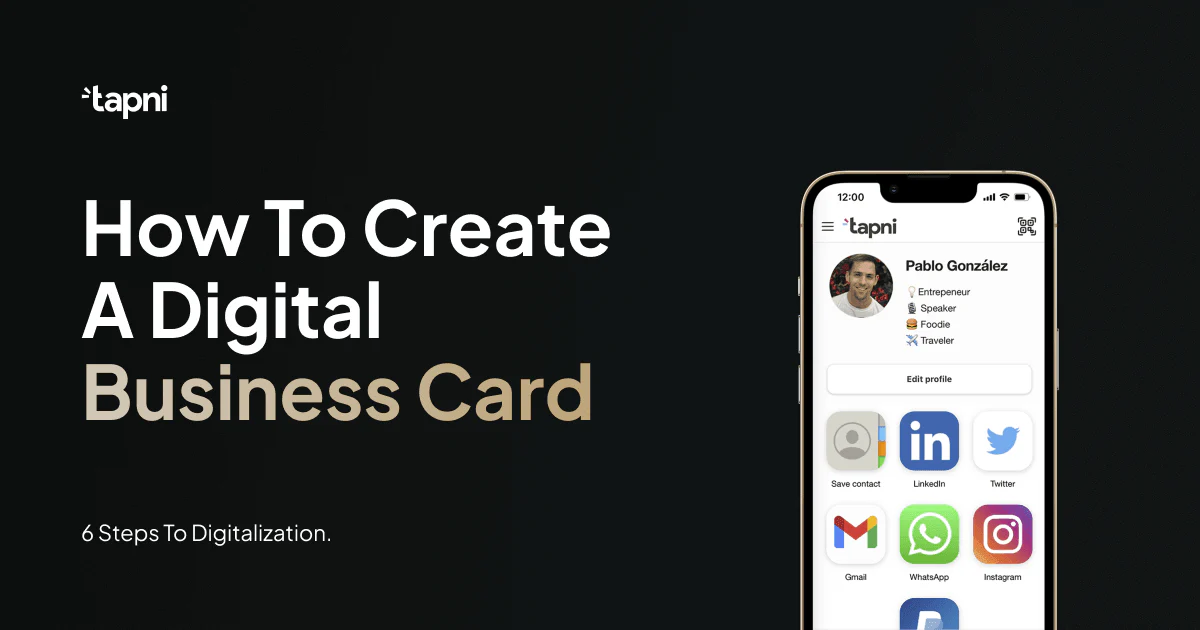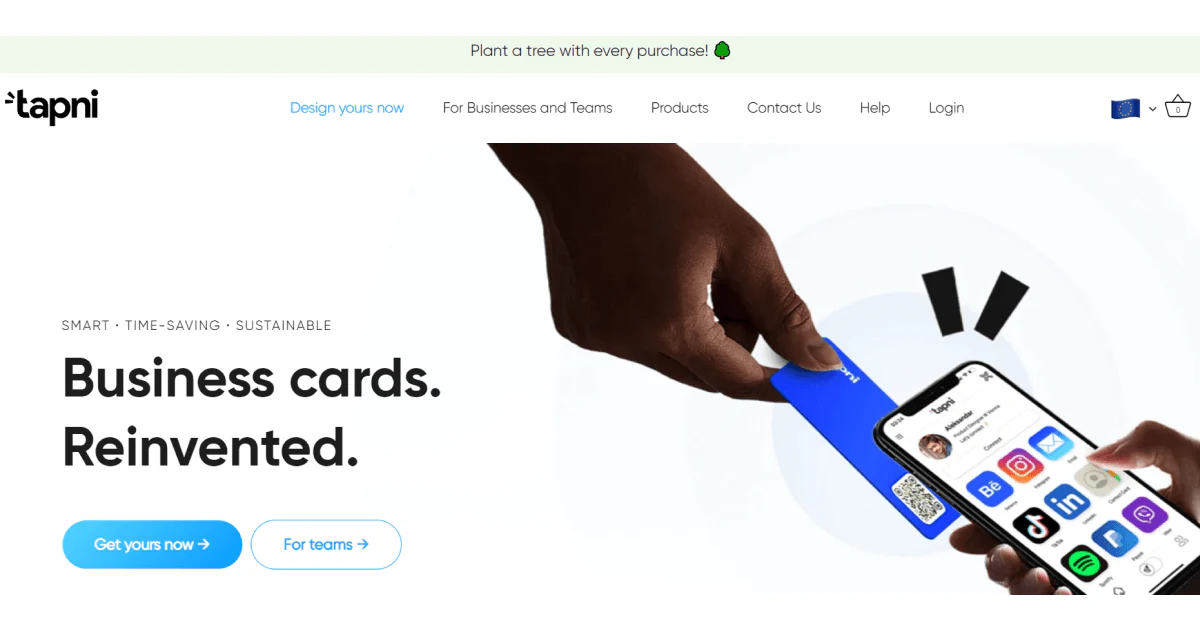Browse our comprehensive product guides and documentation


Are you tired of the hassle that comes with traditional business card systems?
That's not exactly shocking.
These days, it's possible to digitize just about anything. Even with business cards, making a good first impression is important.
Though modern society is progressing at a dizzying rate, the old and traditional culture of business cards is still present — with a different approach though.
At first glance, you may wonder, “why on earth would I bother with digital business cards?”
You could change your mind if you find out the history and significance of business cards.
Furthermore, if you get interested, we can show you how to make a digital business card to bring your company's marketing efforts up to date with modern standards.
Stay tuned!
The first recorded use of business cards dates back to the 17th century when locals publicized the arrival of wealthy or aristocratic visitors to their town (or even their home).

Cards became commonplace among the privileged people around the century's midpoint, and were considered essential for middle-class citizens by the turn of the 19th century.

Some things in the business world never changed, even as the business card culture faded:
✒️Business cards are still used as a means of communication and networking among the world's elite and most successful corporations.
✒️In addition to the name, title, company, and location, business cards should also feature the cardholder's address, email address, phone number, and other contact information you deem appropriate.
✒️A translation into the local language should always be included on the back.
✒️Never use your left hand to pass off a business card.
✒️You should never write on a business card.
✒️Business cards should always be presented in the best possible condition (as neatly as possible).
✒️Typically, business cards are printed in black ink on white paper.
Approximately 27 million business cards are produced daily. Yet, within a week, 88% of those cards had been discarded.
Most business cards (63%) are thrown away because the recipient has no immediate need for the advertised service.
Some people don't keep them for future reference because they assume that they will figure out a solution when the time comes. (this is my personal fact 😇)
Despite this, 57 percent of business owners said that business cards are crucial to the success of their company's marketing efforts.
As a result, a study by Adobe discovered that for every 2000 business cards distributed, a company's sales increased on average by 2.5%.
After looking at the numbers, it's easy to see why some people have opted to make the most of business cards while mitigating the costs and limitations of conventional printing.
One example is Chika Terada, the brains behind Sansan, one of Japan's most prominent business card-centric startups.
When asked if the success of Sansan’s company lies in its priority to meeting new people rather than spreading one's own profile, the Chika Terada responded:
“Well, why it is well-adapted in the Japanese market is because, first of all, people use business cards and we have some trouble managing or keeping track of business cards after they’re received.
Of course, we’d like to replace business cards in the end because we don’t believe in the usefulness of paper business cards at all. This is a culture right now, and it can be altered.”
To fully grasp the effectiveness and success of digital business cards, it's also helpful to understand the technology that supports them: near-field communication (NFC).
It's a group of protocols that allows two electronic devices to communicate at a distance of up to 4 centimeters.
How does this apply to digital business cards?
The utilization of NFC can actually explain its practical use with the following statistics:
Do you still think it's funny to use digital business cards as a marketing tool for your company?
Didn’t think so.
Now that you have the essential information about digital business cards let’s learn how complex it is to create one.
In this section, you’ll get a 5-step procedure that is required to get your digital business card ready.
Follow through!
With the advent of new technologies, there are numerous options for digital business card services from which to pick, such as Tapni, for example.

You should weigh the benefits and drawbacks of each platform before deciding which one is right for you.
For instance, Linq is one of the leading companies for NFC digital business cards that offers a wide spectrum of options, but has limited customization and can be overwhelming.
Tapni is an extremely flexible and budget-friendly solution but doesn't provide US storage at the moment.
Reading this article will help you understand the best digital solutions for your business cards if you want to avoid the confusing experience of comparing tools.
Gather the details you'd like to have on your virtual business card, such as your name, title, company, email, phone number, website, and social media profiles.
In this stage, there is no such thing as incorrect data. Include any details you think will be important for your potential partners to know.
You should now create your card using the online business card platform.
Adding a unique touch that showcases your personality and business is crucial to the success of your business card.
By utilizing digital platforms, you can either design your cards from scratch or make use of one of the available templates.
Make sure to use a brand-appropriate color scheme and font to make your business card easy to recognize.
Make sure your digital business card looks and works exactly how you want it to before sending it out.
Verify that the provided contact information is complete and accurate. For instance, check for any typos, formatting issues, or broken links.
Also, verify the card's layout and functionality across various browsers and devices.
It's time to put your digital business card to use, so pack a lunch and hit the town.
I really like this product because it's so simple to distribute to others.
Let's pretend you're at a business conference where you'll meet a wide range of professionals.
Wouldn't it be nice if you could just touch your business card or scan a QR code to add the contact's information?
As was mentioned at the outset, one of the biggest advantages of digitizing business cards is their usefulness.
By using such a product, you can share business information much more quickly while also maintaining and growing your connections list all in one place with a single swipe.
This step leaves me plenty of room to present the article's most useful section.
Let me unveil to you the digital business card’s clear and ever-lasting advantages it can bring to your company.
Since your digital business card is finally ready, let’s see what implementation of such a product can bring to your business.
Digital business cards can give your company a more polished, expert air.
If you make your digital business cards eye-catching (including logos, images, and other visuals) you can stand out from the competition more easily.
A photo enhancer can help refine and sharpen your images, ensuring they look professional and visually appealing.
Additionally, digital business cards enable you to add compelling descriptions of your business and its services.
The widespread adoption of digital business cards simplifies the process of making and exchanging contact details.
With just a few clicks, you can share your contact information with anyone who might be interested in doing business with you.
We discussed how the cost of printing traditional business cards could add up, especially when purchasing in bulk.
In addition to being free to send to anyone with an email address, digital business cards offer significant financial savings.
Digital business cards have the potential to be interactive, unlike conventional ones.
It is much simpler for people to learn more about your company if you can include links to your website, social media profiles, or other digital content in your digital business card, right?
Utilizing digital business cards is a fantastic step toward making a greener world.
You are literally saving trees by avoiding the need to print physical business cards with the aid of this handy online generator.
We hope that these five steps on how to create a digital business card give you enough information about how simple it is to digitize your company for more effective marketing.
However, if you have a reliable partner who can unlock all of your company's potential for growth, all of these steps are quick and simple.
And, when it comes to face-to-face business interactions, Tapni is the #1 option available on the market.
Tapni is a company that provides a number of services designed for streamlining and optimizing your company's digital presence, internal organization, marketing, and sales.
With Tapni, you can:
🎯 Use innovative ways of communication to share your social media and contact information.
🎯 Adjust the look of your Tapni Card to reflect your branding image.
🎯 Leverage native integrations to generate new leads and directly add them to your CRM.
🎯 Recognize top performers, evaluate event success, and adjust strategy based on valuable insights.
🎯 Utilize products such as the Tapni card, Tapni sticker, Tapni band, and Tapni keychain to get a different level of digitalization of your company's information.
Tapni also offers high-security standards, EU storage, and AWS Cloud Infrastructure, demonstrating its serious commitment to compliance and security.
To start customizing your Tapni digital business card, follow these instructions:
Step 1: Visit our website and choose the digital business card that fits you best.

Step 2: Hit “Design Your Card” and add all the necessary information (logo and name)

Step 3: Add the product to the cart, purchase it, and your product will be at your home address in 1-7 days.
You can also download the app and customize your profile information.
Intrigued to find out more?
Download our Tapni app to create the profile, and start networking on a modern level today!